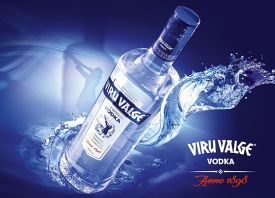Alcohol, Baltic Export, Estonia, EU – Baltic States, Good for Business, Legislation, Markets and Companies
International Internet Magazine. Baltic States news & analytics
Thursday, 18.04.2024, 15:00
Estonia can get the first GI product
 Print version
Print version |
|---|
"The geographical indication helps companies to increase their competitiveness, appreciating the quality of the Estonian vodka and giving consumers better information about the technology of production, qualities and characteristics," said Agriculture Minister Ivari Padar. "The registration of the first geographical indication would be an important step for the whole Estonian food sector, and a good possibility for agricultural producers to add value to their products."
Estonian Vodka is a geographical indication (GI) for vodka, which is manufactured using raw materials grown in Estonia and ethyl alcohol produced of water of Estonian origin. After registering GI Estonian Vodka, this pair of words can be used in the labelling of a product only if the vodka is produced according to the requirements determined in the technical dossier. On labels of other spirits made in Estonia, such expressions can be used in the future as "Vodka from Estonia", "Vodka Made in Estonia", etc.
Support has been expressed to registering Estonian Vodka GI by the Estonian Farmers' Confederation, the Estonian Farmers' Union and the Estonian Rye Society.
AS Liviko will not discard the high quality requirements set for the ethanol suitable for producing the Viru Valge vodka, even if it means that the vodka made in Estonia from Estonian grain cannot be called Estonian Vodka.
"Viru Valge is thoroughly Estonian vodka, but unfortunately the only ethanol manufacturer in Estonia cannot provide the suitable stable quality ethanol necessary for producing it. Liviko has the grain grown in Estonia made into ethanol by a Latvian manufacturer that assures the quality. As an Estonian company, Liviko, too, would like it if the entire process from grain growing to vodka producing would take place in Estonia, but we cannot make exceptions in quality. Viru Valge is made from Estonian grain and Estonian water and its Estonian character does not stem from the origin of the ethanol, but from the quality, traditions and knowledge – how to make vodka with a taste characteristic to our region – which have been passed down from generation to generation," said Janek Kalvi, Chairman of the Board at AS Liviko.
Requirements for the ethanol quality suitable for producing Viru Valge vodka are much stricter that the requirements set by the Minister of Agriculture for Estonian Vodka quality. The ethanol suitable for manufacturing Viru Valge vodka must be completely free from methanol and esters, but the Estonian Vodka is allowed to include 0.5 g methanol and 1 g esters per hectolitre.
Additionally, the geographical indication requirements do not comply with many other Viru Valge quality standards, for instance, ethanol suitable for Viru Valge production must be at least three times less acidic and include three times less aldehydes and dry ingredients than is required for Estonian Vodka. Ethanol suitable for producing Viru Valge is allowed to include a maximum of half the nitro compounds according to the set Estonian Vodka standard.
See the ethanol quality requirements chart.
"Liviko is happy to see the appreciation of Estonian products, but in this case, the Estonian Vodka mark is monopolised to one vodka producer who does not produce food ethanol with suitable quality. Unfortunately, all Estonian vodka manufacturers will end up in a situation where they either have to give up the Estonian Vodka mark or start purchasing ethanol from a direct competitor, which can influence the quality, price and production volumes of Estonian Vodka. We hope that the responsibility for the Estonian Vodka mark will force our good competitor to focus on, in addition to producing heat and fodder, improving the quality of food ethanol. The decision creating the monopoly is based on one producer's lobbying and is not worthy of the centuries-old Estonian vodka tradition," said Janek Kalvi, Chairman of the Board at AS Liviko.
Monopolisation of the geographical indication to one ethanol manufacturer severely breaches the competition law, by giving one producer monopolistic rights disapproved in the EU, and unreasonably endangers the sustainability of Estonian Vodka. If Estonian Vodka can only be made from ethanol produced in Estonia, it becomes a senselessly significant business risk. If the only Estonian ethanol manufacturer should find itself in serious problems due to technical, technological, economic or other reasons and end its work, then no one can produce Estonian Vodka.
One-third of the produced Viru Valge vodka is sold abroad. AS Liviko sells Viru Valge vodka, made from Estonian grain, to 24 countries across the world, where it competes with the top ranking premium brands. Export markets of Viru Valge are: Finland, Russia, Japan, China, Thailand, India, Bahrain, Latvia, Lithuania, Poland, Germany, Denmark, Holland, Portugal, France, United Kingdom, Gibraltar, Austria, Bulgaria, Georgia, Turkey, Uzbekistan, Azerbaijan and Australia.








 «The Baltic Course» Is Sold and Stays in Business!
«The Baltic Course» Is Sold and Stays in Business!

